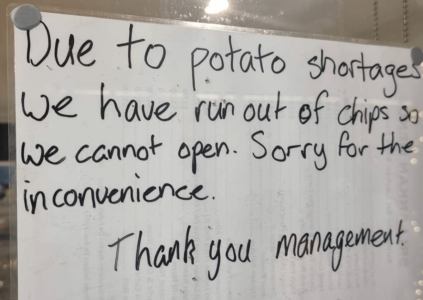Hot Chips in Crisis: Potato shortage forces Coles to impose purchase limits
- Replies 10
Hot chip lovers, watch out - the potato supply in the country is in a tough spot right now, and supermarkets are reported to be feeling the pressure.
It's been one heck of a long and wet season, making it tough for Aussie farmers to plant and harvest their potato crops. But, apparently, that's not the only problem the potato industry is facing.
Recent heavy rains and floods have also significantly reduced crop yield resulting in wholesale costs rising by more than 25 per cent in the past few months.
It's not just farmers who are feeling the heat, though. Pubs, restaurants, fish and chip shops, and even Coles supermarkets are feeling the squeeze as we head into peak hot chip season this summer.

In an effort to mitigate any potential supply difficulties, Coles has reintroduced a two-pack per person limitation on one of the nation's most beloved frozen food items, hot chips - a measure that was temporarily implemented in December.
'Poor weather in the eastern states has affected the supply of some frozen potato products across the industry,' a Coles spokesperson said.
'We thank customers for their patience while we work hard with suppliers to minimise disruption and return stock to normal levels in the coming months.'
Aside from the imposed purchase limits, the potato shortage has also impacted some businesses so much that they have had to close or completely shut down stating a shortage of supplies as the problem. This is especially harmful to small businesses that depend a lot on selling potato products.
For example, Roy's Fish & Chips Takeaway Cafe in Bateman's Bay, New South Wales, was forced to close its doors twice in one week during the New Year holiday season due to a shortage of hot chips. Customers were inconvenienced as a result, and the business reportedly suffered a large loss in income.

The Topz Shopz Deli in Whyalla also said that the shortage forced them to import potatoes from abroad, increasing their operating costs. Moreover, the price of the oil—used to fry the chips—also went up by $25 per drum.
They had to raise the price of their chips to make up for the higher costs, which hurt their sales and customers' loyalty.
To make up for their suppliers' hot chip shortages, several restaurants and bars have decided they will replace supermarket-bought hot chips with house-cut potato chips, hoping that their customers will enjoy them as much as the regular ones.
Needless to say, the potato crisis has been a major headache for businesses, and it may have lasting effects on the food industry as well.
Woolworths has not implemented similar purchase limits and expects its suppliers to normalise by early February.

You read it here, members! Better get over to your local Coles, Woolworths, ALDI or IGA store and grab a few of your favourites - while two packs are plenty to keep your freezers stocked, don't forget to share if you have the opportunity!
Even if it's just by sharing your hot chips, let's help and support one another during these trying times.
Has the shortage affected your household? Let us know in the comments! Meanwhile, here's a video showing how to make your own hot chips at home. (If you don't want to use oil, you can always cook them in an air fryer.)
Credit: taste.com.au.
It's been one heck of a long and wet season, making it tough for Aussie farmers to plant and harvest their potato crops. But, apparently, that's not the only problem the potato industry is facing.
Recent heavy rains and floods have also significantly reduced crop yield resulting in wholesale costs rising by more than 25 per cent in the past few months.
It's not just farmers who are feeling the heat, though. Pubs, restaurants, fish and chip shops, and even Coles supermarkets are feeling the squeeze as we head into peak hot chip season this summer.

Coles is re-introducing purchase limits on their frozen hot chips amidst the ongoing potato shortage in the country. Credit: Pexels/Oleksandr Pidvalnyi.
In an effort to mitigate any potential supply difficulties, Coles has reintroduced a two-pack per person limitation on one of the nation's most beloved frozen food items, hot chips - a measure that was temporarily implemented in December.
'Poor weather in the eastern states has affected the supply of some frozen potato products across the industry,' a Coles spokesperson said.
'We thank customers for their patience while we work hard with suppliers to minimise disruption and return stock to normal levels in the coming months.'
Aside from the imposed purchase limits, the potato shortage has also impacted some businesses so much that they have had to close or completely shut down stating a shortage of supplies as the problem. This is especially harmful to small businesses that depend a lot on selling potato products.
For example, Roy's Fish & Chips Takeaway Cafe in Bateman's Bay, New South Wales, was forced to close its doors twice in one week during the New Year holiday season due to a shortage of hot chips. Customers were inconvenienced as a result, and the business reportedly suffered a large loss in income.

Due to the shortage of hot chips, some local businesses had to temporarily close their doors. Credit: Facebook.
The Topz Shopz Deli in Whyalla also said that the shortage forced them to import potatoes from abroad, increasing their operating costs. Moreover, the price of the oil—used to fry the chips—also went up by $25 per drum.
They had to raise the price of their chips to make up for the higher costs, which hurt their sales and customers' loyalty.
To make up for their suppliers' hot chip shortages, several restaurants and bars have decided they will replace supermarket-bought hot chips with house-cut potato chips, hoping that their customers will enjoy them as much as the regular ones.
Needless to say, the potato crisis has been a major headache for businesses, and it may have lasting effects on the food industry as well.
Woolworths has not implemented similar purchase limits and expects its suppliers to normalise by early February.
Key Takeaways
- Coles is limiting how many frozen hot chips you can buy because there's a shortage of potatoes in Australia.
- The rain and flooding have made it tough for farmers to grow potatoes, which is why there's not enough to go around.
- Some small businesses have even had to close because they can't get enough stock.
- Other places are making their own chips to keep up with the demand.
Even if it's just by sharing your hot chips, let's help and support one another during these trying times.
Has the shortage affected your household? Let us know in the comments! Meanwhile, here's a video showing how to make your own hot chips at home. (If you don't want to use oil, you can always cook them in an air fryer.)
Credit: taste.com.au.







